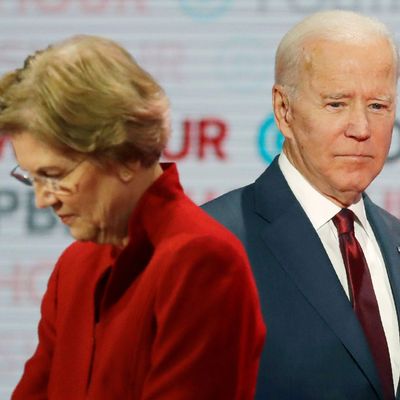
When Elizabeth Warren began her candidacy in 2018, I expected her to be the candidate who would get my vote. She had, in my view, identified the political and policy sweet spots to move her party left: corruption and financial regulation, and she designed effective populist plans to rein in Wall Street and the power of organized money. But her campaign did not quickly catch fire, and over 2019 she tried to woo progressive activists by moving left on a wide suite of social and economic positions, matching every bid put up by Bernie Sanders. As New York Times reporter Astead Herndon noted recently, her use of intersectional rhetoric won the professional left’s acclaim, but left voters in the communities it was attempting to reach cold. By the end, she was boxed out on both sides: She had lost her mainstream appeal to the center left, but was still unable to dislodge the Sanders hardcore.
But Warren won over a committed fan base, and she retains some valuable leverage. How and if she chooses to use that leverage may prove an important question for the presidential race.
For many progressive activists, the priority was that either Warren or Sanders gets the nomination, even if they may have disagreed bitterly on which of the two was better. Those progressives have assumed all along that the ultimate defeat of one of the two would result in combined support for the other. If Warren shares that view, she should, and probably will, endorse Sanders.
However, she may have other goals. If her objective is to push the Democratic Party to the left on economic policy — and especially the combination of anti-corruption and financial-regulatory issues in which she has special expertise — she can advance that goal by trading her endorsement to Joe Biden. And she will have the most leverage if she does it soon.
If Warren offers to trade her endorsement to Biden, she might plausibly ask for one or more of the following:
• Endorsement of some of her plans
• Veto power over major financial-regulation positions
• Director of the Consumer Financial Protection Bureau (which was her idea)
• Treasury secretary
• The vice-presidency
Biden might or might not be ready to offer the vice-presidency — depending on which constituencies he needs to shore up — but everything else on that list is probably on the table. Financial regulation and corruption are an issue space where Biden can not only afford to move left, but has an incentive to do so. He is being attacked on policy by Sanders during the primary, and on corruption by Trump in the general election. Putting Warren’s good-government imprint on his candidacy would help cover some of the weak points in his profile.
Biden of course has tangled with Warren on these issues before. He represented a state that depends on the credit-card industry, and — as basically all senators do when home-state interests are at stake — backed them up and opposed her bankruptcy reforms. But Biden is also a politician who tends to mold himself to the mainstream Democratic position at any given time, and he is malleable on financial regulation. Biden has toyed with a financial-transaction tax — reportedly considering including it in his package of tax increases on the rich, then omitting it, but then telling John Harwood he favored such a measure a couple of days later. He has strongly favored Dodd-Frank, which included creation of the CFPB, but he can be pushed farther.
Of course Warren might also negotiate with Sanders — she will probably be smart enough to bargain with both, increasing her leverage. But while Sanders needs her endorsement more, he probably has less to offer. Sanders is already on the far left on every issue Warren cares about. He might be able to offer the vice-presidency, though a scenario where Sanders wins might require him to go deeper into the Democratic mainstream to hold the center.
In any case, Sanders has a much lower chance of winning the nomination. In the immediate aftermath of Super Tuesday, there is a dearth of polling, but Biden has probably taken a solid national lead, and the remaining states appear distinctly more favorable to him than those that have already voted. FiveThirtyEight’s forecast made Biden a two-to-one favorite over Sanders before Super Tuesday, and his odds have almost certainly increased, perhaps by a lot. He is still in a competitive race, though, which means Warren has the most leverage before Biden likely pulls away in the delegate race.
Maybe Warren has different goals than the ones I hypothesized above. Or maybe she doesn’t want to split her fan base by interceding in the primary before it’s settled. But if she cares about the issues that she has traditionally fought for, the path to progress is in cutting a deal with the probable nominee, Joe Biden.






























